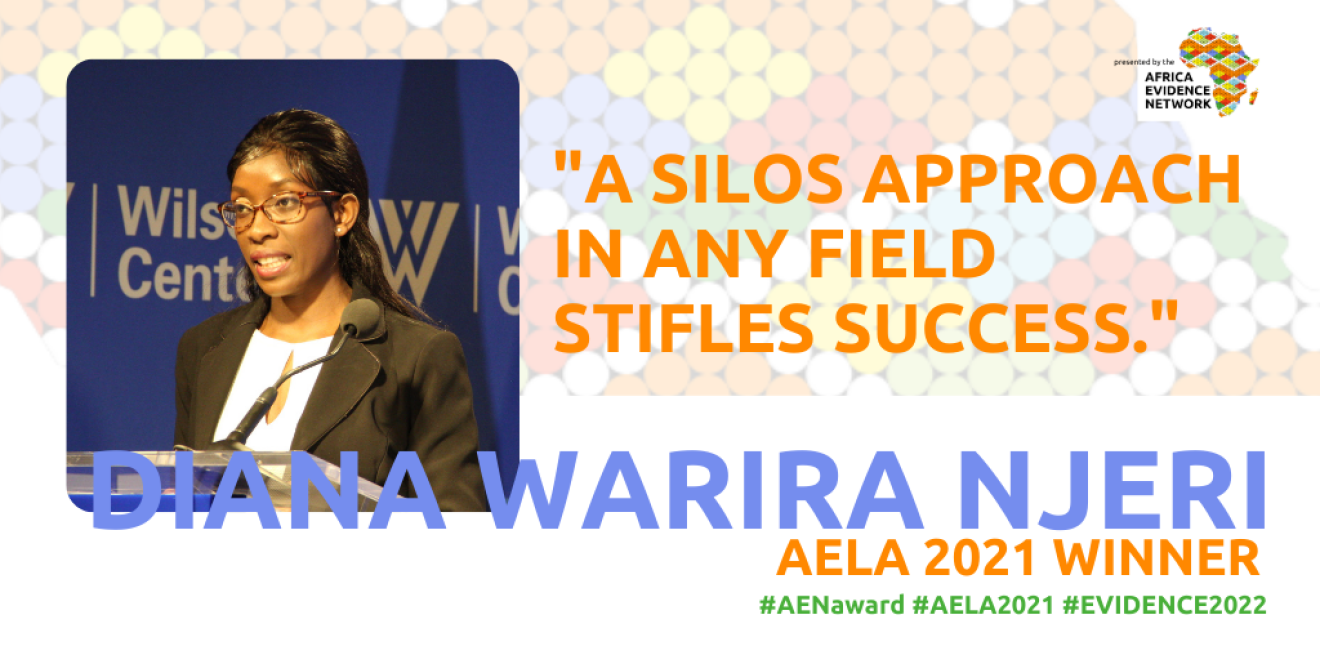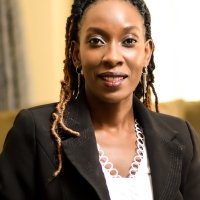Diana Warira Njeri is the 2021 winner of the Africa Evidence Leadership Award (AELA) offered by the Africa Evidence Network (AEN). AEN caught up with Diana about receiving the award and asked her some questions about what the Africa Evidence Leadership Award means for her work.
What was your first thought when you were told you had won the Africa Evidence Leadership Award 2021?
Immediately I saw the email, everything stood still! I froze up. And then my career over the last decade flashed through my mind. I thought, oh my! You mean my passion for development communication and evidence-informed decision-making (EIDM) is finally paying off? I won this award? Is this even real? To be honest, I got quite emotional and I read the email several times!
What role do you think the Africa Evidence Leadership Award plays in the evidence ecosystem in Africa?
This award has to be one of the greatest initiatives on the continent as far as continuously building the evidence ecosystem is concerned. Appreciating individuals who have shown exemplary leadership in EIDM across a broad set of dimensions is quite innovative and I applaud the Africa Evidence Network (AEN) for this. This initiative shows how well the AEN has understood the evidence ecosystem and is actively doing things to motivate all the different players to continue working to strengthen EIDM in Africa. There are actors supporting and strengthening evidence-use, evidence production, advocacy and mediation, enhancing structures and creating enabling environments for the use of evidence for decision-making, among other facets.
Further, in my view, the award also elevates the individuals’ work and helps draw attention to their efforts to strengthen EIDM right from the nomination through to the voting process. Being a nominee of this prestigious award means that you are doing something right, and someone (or people) somewhere are noticing and they appreciate you for it. Winning the award takes you several steps ahead and it helps validate (should you have been in doubt) that indeed your efforts to build a better Africa are in the right direction; you are recognized as leading the way and you are appreciated for it.
When I started this journey, it never occurred to me that people outside my workplace would notice what I was doing.
Describe how you believe your work will benefit from receiving this award, and why it is important?
This award has helped raise the profile of my existing communications work and consistent advocacy for EIDM. Since the nomination and final announcement that I won the award, more people know about my writing and overall engagement in this field. I am glad the different conversations I have had with various audiences now have a broader reach within and outside of the evidence ecosystem.
In addition, I believe this award shall encourage those in the communications space not to shy away from being active voices in supporting and strengthening EIDM in Africa. I also see this award as motivating individuals who are neither researchers nor policy-makers within the evidence space, as these two groups have been more of the traditional players in the evidence ecosystem. I believe this award will also strengthen my current role at J-PAL/IPA by raising the profile of my work with researchers and policymakers in East Africa, in addition to opening doors to new engagements within and outside the EIDM community. My vision is to sit at the highest levels of government one day, and work for an Africa where EIDM is the norm, rather than the exception. This award is a step in the right direction.
Further, the AELA gives me an opportunity to showcase my work through high-level global platforms facilitated by the travel grant, and I look forward to sharing my experiences and insights. I also look forward to collaborating with the AEN in a variety of ways to continue advocacy for EIDM as the AEN ambassador over the next year.
What do you hope your contributions to EVIDENCE 2022 will be?
I am hoping to contribute in as many ways as possible. Part of this award’s expectation is that I will give a keynote address at the next EVIDENCE event. I am hoping that this address will be one that motivates and inspires a diverse set of audiences to reach outside of their comfort zone and be change agents in society, more so those working in my field of communications. I will not reveal too much, but I am already getting some ideas! I am glad I have several months to prepare and there is a great support system within and outside the AEN to guide and support me through this process. I am also hoping that this opportunity to speak at EVIDENCE 2022 inspires young African leaders (current, emerging and future ones), and especially young women, to rise above the barriers and reach for their dreams.
I also hope to actively contribute to planning for the event. I will be participating in one of the AEN working groups that aligns best with my keynote, as we work towards imagining what EVIDENCE 2022 can be. I am also open to more ideas from the AEN on how I can be of value as we progress towards EVIDENCE 2022.
Share with new colleagues coming into the evidence-informed decision-making space in Africa what makes this industry important and what defines a leader in this field?
Africa has suffered several development challenges for decades. From food insecurity, to high disease burden, unemployment, poverty and inequality, and many more. And now we have COVID-19, a pandemic that has ravaged even the strongest of world economies. With these challenges, and the many more expected, ensuring that public policy decisions are informed by evidence is our best bet to ensuring a sustainable future both for current and future generations, moreso with limited resources. This means that there is a lot to be done to strengthen EIDM in Africa and we need as many hands and voices as possible. For instance, we need to strengthen the capacity of policy-makers to use evidence, and that of researchers to generate policy-relevant research and define actionable policy recommendations. We also need strong communicators and advocates who can synthesize evidence for ease of use by decision-makers, and build coalitions across the research and policy interfaces to strengthen the EIDM ecosystem in Africa. And this is not an exhaustive list of what can be done.
With these diverse areas of contribution to EIDM in mind, I see various dimensions of what defines a leader in this field:
One, an EIDM leader needs to have a good sense of what the different pieces are and where their strength lies. As a communications professional, I have found ways of using my skills for storytelling and analysis of situations in the development context through a communications lens. I therefore encourage new colleagues to find their ‘fit’ and run with it.
Two, an EIDM leader will not shy away from building strong and meaningful relationships with the different players in the evidence ecosystem and finding ways of synergizing with others. A silos approach in any field stifles success. Over the years, I have found myself comfortable engaging with policy-makers, researchers, and knowledge brokers, and I have collaborated with all these groups in different ways.
Three, an EIDM leader is always willing to learn and open to the many forms in which learning presents itself over time. Through learning and staying updated with the practice and literature, I have also found ways of adding to the discourse through scholarly publishing and other forms of writing and engagement. An EIDM leader should also find their voice in the ongoing conversations and leave a mark.
Four, an EIDM leader should surround themself with people who share their passion. They may occupy the same or different parts of the evidence ecosystem, but an EIDM leader knows that growth comes not only through filling your cup but also pouring into others’. For instance on the one hand, I have benefited immensely by tapping into the expertise of those who have been in the EIDM field longer than I have. On the other hand, through my engagements on the demographic dividend with YALI alumni, I have built relationships with young African leaders who I am mentoring to be strong demographic dividend advocates, with their advocacy hinged on strong context-specific research.
This blog post was originally published by the Africa Evidence Network. The views expressed are the sole responsibility of the author.






